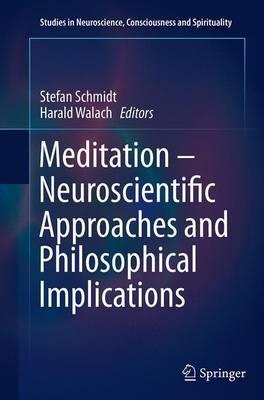Overview
This volume features a collection of essays on consciousness, which has become one of the hot topics at the crossroads between neuroscience, philosophy, and religious studies. Is consciousness something the brain produces? How can we study it? Is there just one type of consciousness or are there different states that can be discriminated? Are so called “higher states of consciousness” that some people report during meditation pointing towards a new understanding of consciousness? Meditation research is a new discipline that shows new inroads into the study of consciousness. If a meditative practice changes brain structure itself this is direct proof of the causal influence of consciousness onto its substrate. If different states of consciousness can be linked with properties and states of the brain this can be used to study consciousness more directly. If the sense of self is modifiable through meditative techniques and this can be objectively shown through neuro-imaging, this has profound implications for our understanding of who we are. Can consciousness, in deep states of meditative absorption, actually access some aspect of reality which we normally don't? Meditation research can potentially foster us with a new access to the phenomenological method in general. This has even been branded with a new catch-phrase: Contemplative Science. It brings together the most modern neuroscientific approach and the most advanced phenomenological methodology of studying the mind from within, through highly skilled self-observation that has gone through many thousand hours of honing the capacity to look carefully, without distraction. This book addresses these issues by bringing together some of the leading researchers and thinkers in the field. The scope of the volume reaches from first person neuroscience to Indian philosophy, from pedagogic applications to epistemological aspects and from compassion meditation to the study of brainactivity.
Full Product Details
Author: Stefan Schmidt , Harald Walach
Publisher: Springer International Publishing AG
Imprint: Springer International Publishing AG
Edition: Softcover reprint of the original 1st ed. 2014
Volume: 2
Dimensions:
Width: 15.50cm
, Height: 2.20cm
, Length: 23.50cm
Weight: 6.321kg
ISBN: 9783319377506
ISBN 10: 3319377507
Pages: 411
Publication Date: 27 August 2016
Audience:
Professional and scholarly
,
Professional & Vocational
Format: Paperback
Publisher's Status: Active
Availability: In Print 
This item will be ordered in for you from one of our suppliers. Upon receipt, we will promptly dispatch it out to you. For in store availability, please contact us.
Table of Contents
Introduction: Laying out the Field of Meditation Research, S. Schmidt, H. Walach.-Towards an Epistemology of Inner Experience, H. Walach.- The Meditative Approach to Awaken Selfless Insight, W.J.H. Austin.- Meditation as First-Person Methodology: Real Promise—and Problems, J. Shear.- Using First-Person Reports during Meditation to Investigate Basic Cognitive Experience, W. Hasenkamp.- I am I from moment to moment: Methods and results of grasping intersubjective and intertemporal neurophysiological differences during Meditation states, T. Hinterberger.- Does neuroimaging provide evidence of meditation-mediated neuroplasticity? S. Clausen, et al.- Opening up Meditation for Science: The development of a meditation classification system, S. Schmidt.- The Neurobiology of Meditation and Mindfulness T. Esch.- Meditation Effects in the Social Domain: Self-Other Connectedness as a General Mechanism? F-M. Trautwein, et al.- Mindfulness Meditation and the Experience of Time, M. Wittmann and S. Schmidt.- Meditation and Hypnosis at the Intersection between Phenomenology and Cognitive Science, M. Lifshitz, et al.- Insights from Quiet Minds: The Converging Fields of Mindfulness and Mind-Wandering, M.D. Mrazek, et al.- Can Contemplative Science Bring Meditation to (Western) Life? N.A.S. Farb.- Spiritual Phenomena as Public Goods: Exploring Meditation beyond the Standard Model, T. Falkenberg.- Does Meditation Give Us Unique Insight into Ultimate Reality? The Ethical Aim of Buddhism, H. Edge.- God or Ultimate Reality in Theory and Practise - A Philosophical Analysis, A.L.C. Runehov.- The Concept of Tri-Guna: A Working Model, M. Puta and P. Sedlmeier.- Meditation – a link to spirituality and health. A novel approach to a human consciousness field experiment E. van Wijk, et al.- Mindfulness in German Schools [MISCHO] – A specifically Tailored Training Program: Concept, Implementation and Empirical Results Vera Kaltwasser, S. Sauer, N. Kohls.
Reviews
Author Information
Tab Content 6
Author Website:
Customer Reviews
Recent Reviews
No review item found!
Add your own review!
Countries Available
All regions
|




